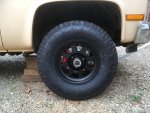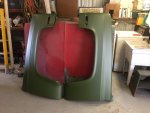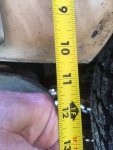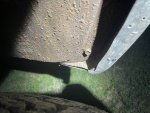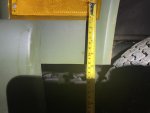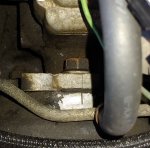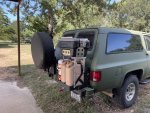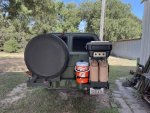Busy times since I updated the Cowdog saga last. A week or so after the last post the a/c stopped cooling. Well, the front wasn't cooling but the rear a/c still was. Ice was forming at the orifice right at the entrance to the evaporator so I became convinced the orifice was either blown or clogged. Those of you that have read this entire thread might remember that I have a blue Ford orifice tube in this truck to compensate for running R-134A in a R-12 system. The blue Ford orifice is .068" in diameter compared to the white GM orifice which is .072"
The rear a/c has an expansion valve and except for sharing the compressor, condenser and lines is separate. I knew my guess was wrong as soon as I hooked up the machine to evacuate the system. Out of 64 ounces supposed to be in. Only 28 were recovered. I had a leak!
I had installed the blue Ford orifice 4 years ago to help low compressor speed cooling. Basically so it would be colder at the vent when I was in stop and go traffic compared to just cold going down the highway. Ford also has a red orifice that is .062" diameter. I decided to swap that in since I thought the orifice was my issue before I realized it was probably just low refrigerant. No leak was detected using vacuum so I had to charge it up and do a soapy water spray bottle bubble check. A crack in a weld on the O'Reilly's new when I built the truck cross flow condenser was found. It had a lifetime warranty and they honored it.
New condenser, red Ford orifice tube installed and 64 ounces of R-134a later I thought I was set. Jennifer and I had to move some furniture for her mom in Houston in May. We took the Cowdog with a M101 trailer with a cargo cover on since rain was expected. We had below 40° at the center vent driving down there in the morning. Once we loaded up though it was 95° outside with about the same humidity. It wouldn't get below 70° at the vent in traffic and barely below 55° after 100 miles of straight highway driving. The red Ford orifice was not an improvement.
So, just to cover all the bases I decided to put a stock white GM orifice tube in. It is .072" diameter. Below 85° outside temp it did ok but never really pulled the vent temp down below 50° even on the highway. I went back to a blue Ford .068" like I had for the previous 4 years and get 40° at the center vent if it is below 85° outside. Above that it will creep up to around 48-50° at the vent when it is around 100° outside. Which really isn't that bad for a system designed 50 years ago using a refrigerant not even thought of at the time of the design and a compressor that probably is just a tad too small for my dual ac system.
Then my son Colton graduated college, got a job, got married and bought a house in about a 6 week span. The Cowdog racked up the miles and did great moving junk all over Texas.



